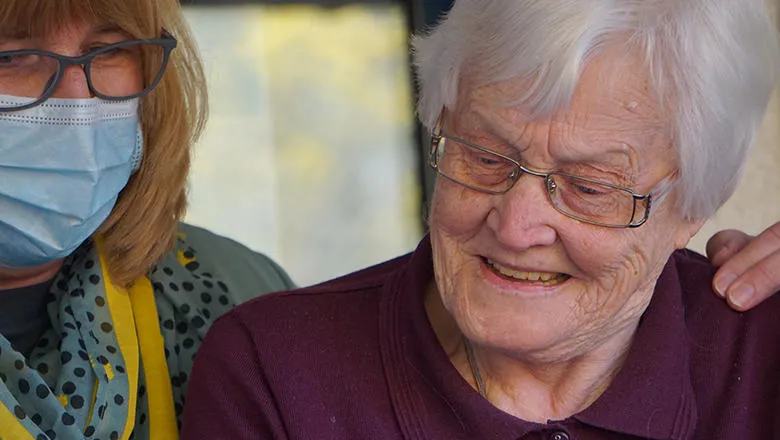
Dr Anna Bone PhD, MPH, BA
Lecturer in Epidemiology and Palliative Care
Research interests
- Palliative care
Pronouns
she/her
Biography
Dr Anna has a BA in Human Sciences from The University of Oxford, a Masters in Public Health (MPH) from Imperial College London and a PhD from King’s College London. Anna began working at the Cicely Saunders Institute in 2013. During this time, Anna has worked on research studies relating to palliative care provision for frail older people. This included OPTCare Elderly, a study developing and testing a short-term integrated palliative and supportive service for frail older people in the community, and the International Access Rights and Empowerment Study (IARE) II, which examined the needs, preferences and experiences of frail older people with acute illness who do not have access to specialist palliative care.
Research Interests
- Patterns of emergency hospital attendance among older people towards the end of life
- Models of palliative care for older people including care home residents
Enquiring about potential PhD supervision
Dr Anna is currently supervising PhD student with project title: "Development and feasibility evaluation of a personalised intervention on sedentary behaviour and physical inactivity among adults at risk of, or with sarcopenia in nursing homes".
If you’re thinking of applying for one of our PhD programmes and are looking for potential supervisors, please email nmpc_pgr_enquiries@kcl.ac.uk listing the names of the supervisors you’ve identified as having expertise in your chosen area, along with your CV and a short research proposal.
Our Postgraduate Research Team will contact supervisors on your behalf and get back to you. If you have any queries in the meantime, please use the email address above, rather than contacting potential PhD supervisors directly, because they are unable to respond to initial enquiries.
Research profile
Research

International Access Rights & Empowerment II
IARE II is an observational study of frail older people who do not have access to specialist palliative care services.
Project status: Ongoing

Better End of Life Project
Understanding experiences of dying, death, and bereavement in the UK, and compelling local and national policy-makers to act to improve people’s experiences.
Project status: Ongoing

Integrated Community Palliative Partnership
The Integrated Community Palliative Partnership (ICPP) is a study that aims to develop a model of community palliative partnership working in care homes.
Project status: Ongoing

Optimising Palliative Care for Older People in Community Settings
OPTCare Elderly aimed to improve the quality of life for older people by developing a new short-term integrated palliative and supportive care service.
Project status: Completed

Evaluation of the COVID-19 Pandemic Response in Palliative & End of Life Care: Connecting to Boost Impact & Data Assets
The CovPall-Connect project provides an opportunity for national data linkage on the palliative care response to COVID-19.
Project status: Ongoing

CovPall Care Homes: Rapid Evaluation of the Care Home Response to the Need for Palliative & End of Life Care During the COVID-19 Pandemic
This CovPall Care Homes Project looks at integration, communication and workforce resilience in Care Homes during the COVID-19 pandemic.
Project status: Completed

The Impact Centre for Palliative and End-of-Life Care
The Impact Centre aims to close the gap between evidence and practice, ensuring that everyone approaching the end of life receives the best care possible.

Understanding death literacy across the United Kingdom
This study measures death literacy in the UK and examines sociodemographic and experiential factors influencing levels across the population.
Project status: Ongoing
News
Almost one in three people in England die without the basic care they need
Around 170,000 people in England every year spend their final days in pain, distress or without vital support that should be available to everyone at the end...

Research shows end of life care was not seen as an essential, frontline service in the pandemic
Findings from a new report prompt calls for proper recognition and sustainable funding of end of life care and bereavement support.

Foundations for Future Care
As it's World Hospice and Palliative Care Day we thought we'd share a story from the Autumn 2018 issue of InTouch about the importance of end of life care.

Community settings may replace hospital as most common place to die in Scotland by 2040
New research urges investment in end of life care at home and care homes to cope with expected demand.

Features
5 minutes with Anna Bone
Anna Bone is a Lecturer in Epidemiology and Palliative Care in the Faculty of Nursing, Midwifery and Palliative Care. Below she tells us about her progression...

Research

International Access Rights & Empowerment II
IARE II is an observational study of frail older people who do not have access to specialist palliative care services.
Project status: Ongoing

Better End of Life Project
Understanding experiences of dying, death, and bereavement in the UK, and compelling local and national policy-makers to act to improve people’s experiences.
Project status: Ongoing

Integrated Community Palliative Partnership
The Integrated Community Palliative Partnership (ICPP) is a study that aims to develop a model of community palliative partnership working in care homes.
Project status: Ongoing

Optimising Palliative Care for Older People in Community Settings
OPTCare Elderly aimed to improve the quality of life for older people by developing a new short-term integrated palliative and supportive care service.
Project status: Completed

Evaluation of the COVID-19 Pandemic Response in Palliative & End of Life Care: Connecting to Boost Impact & Data Assets
The CovPall-Connect project provides an opportunity for national data linkage on the palliative care response to COVID-19.
Project status: Ongoing

CovPall Care Homes: Rapid Evaluation of the Care Home Response to the Need for Palliative & End of Life Care During the COVID-19 Pandemic
This CovPall Care Homes Project looks at integration, communication and workforce resilience in Care Homes during the COVID-19 pandemic.
Project status: Completed

The Impact Centre for Palliative and End-of-Life Care
The Impact Centre aims to close the gap between evidence and practice, ensuring that everyone approaching the end of life receives the best care possible.

Understanding death literacy across the United Kingdom
This study measures death literacy in the UK and examines sociodemographic and experiential factors influencing levels across the population.
Project status: Ongoing
News
Almost one in three people in England die without the basic care they need
Around 170,000 people in England every year spend their final days in pain, distress or without vital support that should be available to everyone at the end...

Research shows end of life care was not seen as an essential, frontline service in the pandemic
Findings from a new report prompt calls for proper recognition and sustainable funding of end of life care and bereavement support.

Foundations for Future Care
As it's World Hospice and Palliative Care Day we thought we'd share a story from the Autumn 2018 issue of InTouch about the importance of end of life care.

Community settings may replace hospital as most common place to die in Scotland by 2040
New research urges investment in end of life care at home and care homes to cope with expected demand.

Features
5 minutes with Anna Bone
Anna Bone is a Lecturer in Epidemiology and Palliative Care in the Faculty of Nursing, Midwifery and Palliative Care. Below she tells us about her progression...

